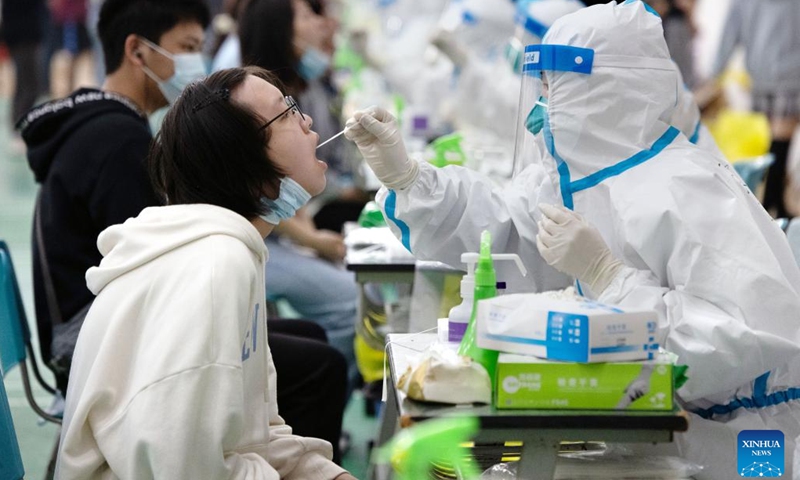
A medical worker takes a swab sample from a student for nucleic acid test at a university in Qingpu District of east China's Shanghai, March 14, 2022.(Photo: Xinhua)
Shanghai's implementation of staggered closed-off management amid the COVID-19 resurgence is generating some knock-on effects on a broader extent, not only adding pressure to surrounding areas in the Yangtze River Delta by disturbing economic links like logistics and personnel exchanges, but also raising concerns for global energy demand.
However, the actual impact of the measures is still within a tolerable range, as the metropolis goes to great lengths to keep major transportation and production entities running despite restrictions on residents' movements, businesspeople and experts told the Global Times on Tuesday.
The Chinese financial hub is carrying out two-phased mass testing and closed-off management in a bid to stamp out a fierce wave of COVID-19 resurgence. The management started in the eastern side of Shanghai on Monday, and it is scheduled to shift to the western side on Friday.
The mass testing measures, considered the city's most stringent anti-virus measures so far, are being rolled out after the city battled a fierce wave of infections over nearly a month. On Monday, Shanghai reported 96 new confirmed cases and 4,381 locally transmitted asymptomatic cases.
Several overseas media outlets linked Shanghai's situation with an overnight global oil price slump, citing investors' concerns that there are expectations of further supply chain disruptions and a fall in energy demand.
The Brent crude futures contract, a global benchmark for oil prices, was down 4 percent at $115.8 per barrel on Monday.
Lin Boqiang, director of the China Center for Energy Economics Research at Xiamen University, said that the reports reflect the "worries" and "divergent thinking" of certain overseas analysts, but not the general market as major Chinese oil stocks are still stable.
He stressed that the oil price drop has little to do with Shanghai's mass testing, as the city only accounts for a tiny amount of the world's total energy consumption, but has more to do with geopolitical instability in Europe over the Russia-Ukraine conflict.
Sinopec Shanghai assembled employees at more than 100 gas stations in parts of Shanghai within hours after the mass testing order was issued. It also opened a green channel in some districts to facilitate employees' movements in order to guarantee fuel supplies for the city, a report by sinopecnews.com.cn said.
On a local basis, however, Shanghai's closed-off management is indeed casting a shadow on economic activities in the city as well as surrounding regions, as it sent shockwaves through logistics, consumption, people-to-people exchanges and other sectors.
Liu Hongyuan, CEO of compression socks maker Hangzhou Zhongzhi Industry Co, told the Global Times on Tuesday that it received notices from certain logistics companies to halt services in Jiangsu and Zhejiang provinces and Shanghai until April 2.
A freight agency also suggested that it has stopped delivering large parcels of products to the Shanghai Port, causing some inconvenience as many of the company's products go through the Shanghai Port for export shipping.
"Overall, the Shanghai mass testing has us a little stuck in transporting our product samples, but the impact is not large," he said.
The Shanghai Port confirmed to the Global Times on Tuesday that it is operating as usual around the clock.
Ouyang Hongjing, a general manager for fabric producer Suzhou Jingzhi Textile Technology Co, said that some clients in Shanghai had canceled orders recently amid the COVID-19 outbreak.
"As the coronavirus resurges, we spend every day in apprehension, worrying our neighborhoods and factories might be sealed off as well," he told the Global Times.
Cities in the Yangtze River Delta, including Shanghai, are closely intertwined businesswise, as they supply each other and there are a lot of cross-city economic activities.
However, they still believed that the impact of Shanghai's mass testing will be limited on the economic performance of the whole Yangtze River Delta region, as production and logistics are not going through a complete paralysis in the area.
"Shanghai has not chosen 'static management' as some other affected regions did. As long as the logistics and manufacturing services industries are running normally in Shanghai in general, the negative impact on the city's or surrounding regions' economic operations is controllable," Chen Liu, deputy dean of the Yangtze Industrial Economic Think Tank, told the Global Times.
According to Chen, once the country has more experience in battling the Omicron variant, the impact of the epidemic might lessen in the second or third quarter, though there would certainly be a toll on first-quarter GDP.
Veteran macroeconomic analyst Tian Yun insisted that China's GDP won't be largely dragged down, as life service industries, the hardest-hit victim of the sealing-off measures and the highlight of Shanghai's economy, account for only a small part of China's overall economic aggregate. He predicted that China could achieve an above 4 percent GDP growth rate in the first quarter.
"The most dangerous impact is not about the GDP slowdown, but about people's negative expectations, which are already causing some factories to lay off staff," he said, adding that local governments should not stop searching for a balance between COVID-19 containment and economic stimulation.




